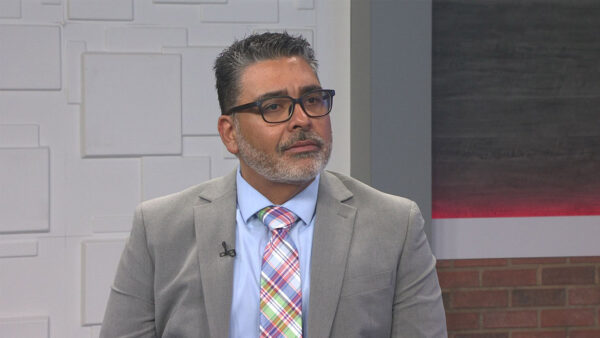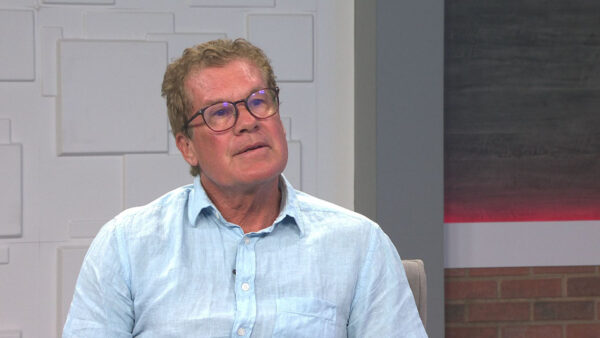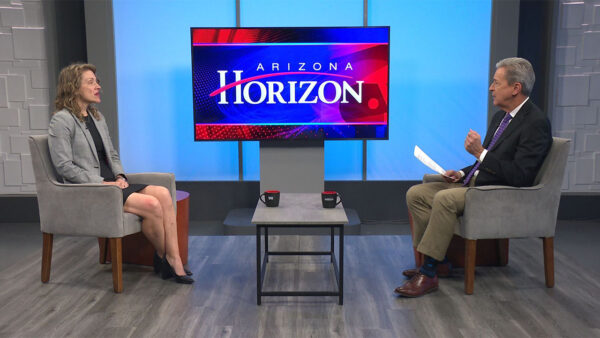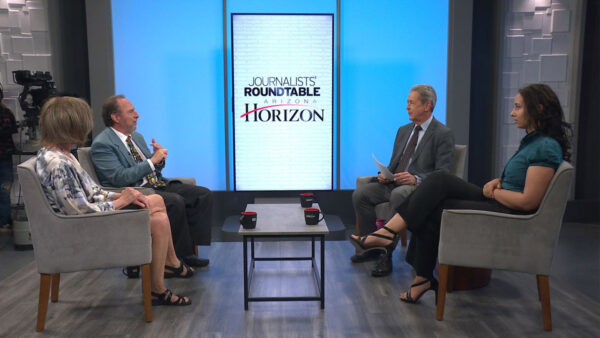A conservationist who represents a coalition of conservation groups will counter statements made by U.S. representatives about a land swap needed for a copper mine near Superior. Roger Featherstone of the Arizona Mining Reform Coalition will respond to comments made about the land swap.
Ted Simons: Good evening, and welcome to "Arizona Horizon." I'm Ted Simons.
Ted Simons: Arizona congressman Paul Gosar was on our show last week and he spoke in support of a proposed land swap needed for a planned copper mine near superior. Tonight we hear from a conservationist who is against the land swap and the mine. Roger Featherstone is here with the Arizona mining reform coalition. OK, let's get the generalities and first and then hear what congressman Gosar and congresswoman Kirkpatrick have to say. Why is this mine a bad thing for Arizona?
Roger Featherstone: It's just not good public policy. There's a process in place that all the other large copper mines, proposed copper mines in the United States go through, and that entails first writing a mining plan of operations, then going through the public review process, then getting a decision. And in this case they're short circuiting that and going straight to Congress for relief from the process, and that's not good policy.
Ted Simons: How are they short circuiting this?
Roger Featherstone: If they go - The way the bill is written, and this is the 12th bill that we've been dealing with in this issue, as the bill is written, there will be no need, but before the land exchange, and then after the land exchange is done, all the decisions are made, so any analysis and alternatives would be more or less meaningless.
Ted Simons: NEPA is the national environmental policy act and the standards therein are what need to be addressed before the mine can go through. When we spoke with congressman Gosar about NEPA, he says that the mine simply can't go through without these NEPA studies. Less hear what he had to say.
Congressman Gosar: A lot of people would like to see a preNEPA done before any land exchange. That's like you and me, if I'm telling you property, you have to go through planning and zoning and the whole environmental aspects before we transfer. Congress has that aspect. Our bill precludes anything going forward within that mine without going through the proper environmental protections. It's already being done. They can't go past go in order to do that.
Ted Simons: If the idea is regardless of when the NEPA studies are done, there is no mine without NEPA studies, what's the problem?
Roger Featherstone: There's a disconnect here between what Mr. Gosar says and what is written in his bill. It's very puzzling to me how there's such a big disconnect. NEPA is a law that requires the forest service, any federal agency to study a proposal, make alternatives, and get all the information in before they make an informed decision. If you- If there's no decision to be made, there's no reason to do the analysis. The way it should happen would be what happened in the Safford mine, when that was permitted, which involved also a land exchange. What happened was the mining company wrote a mining plan of operations that included the land transfer and the mining plan of operations, that was study and reviewed by the forest service and the public, it came to a decision. That's the way it should be done. Not by going straight to Congress for relief.
Ted Simons: But getting to the ends justifying the means, if there is no mine without NEPA study, does it matter when the NEPA studies are done?
Roger Featherstone: Yes, it matters very much. And it's an open question as to whether -- If there's no federal nexus, whether there would even be an analysis done by NEPA. The forest service themselves when they testified in front of the committee this march on this version of the land exchange said clearly that NEPA studies should be done before a decision is made, and if- Unless that happens, it is meaningless to do the NEPA if there's no decisions to be made.
Ted Simons: You mentioned the mining plan of operation, critics are upset because there is no formal plan filed as of yet, but congressman Gosar said critics are jumping the gun because the plan of operation should be ready by year's end. Let's see what he had to say.
Congressman Gosar: That's not due yet. That's coming up shortly in the timetable of aspects. Be patient, and look. These are the numbers that are coming forward. In the mine plan of operation they're going to come forward with those, and they've pretty much got everything resolved. They're carrying over on half of the 50-year water supply, they've invested in reclamation for reused water to use over and over again. The only thing that they're working on and they've had a very open process is where they'll place the tailings. They've been having great ideas in regards to looking at ABC for construction for our roads, but open to the public to those dialogues.
Ted Simons: It sounds like half the operation concerns are resolved, and that water supply issues and -- Except for tailings, but much of the mining plan of operation has been resolved and according to the congressman, it's not even due yet.
Roger Featherstone: Rio Tinto has started the process in 2004. They had plenty of time to write the mining plan of operations. Instead they gambled on going to Congress, which would avoid the mining plan of operations until they got the land in private ownership, which is something they've- They all along they've been very reluctant to put out a plan before they got their bill. And now they've got to put up or shut up, so now they're making this move to get the public involved, help them find a tailing site. They've had 10 years to do this. This is one of the largest mining companies in the world, and if they could not have come up with a complete plan in the last 10 years instead of at the last minute throwing something together, then they have no right to be mining at the site to begin with.
Ted Simons: Whether or not they're throwing something together to have a mining operation ready by year's end, is that not good enough?
Roger Featherstone: No. Because- Well, it is good enough if the land exchange bill itself is halted, and that whole process is halted until the review of the mining plan is allowed to happen. A mining plan in itself can be either good mining plan or a bad mining plan, and it takes a while to figure out exactly what is going to be in that document to know whether they've actually covered all their bases.
Ted Simons: There are also concerns regarding American Indian sacred areas in that particular region. Do you see those as concerns as well?
Roger Featherstone: Absolutely. Absolutely. Hope flat is clearly a sacred site to many tribes. And the land exchange is opposed by every tribe and pueblo in the United States through the national Congress of American Indians and the inner tribal council of Arizona. So this is clearly a sacred site. And of course has a lot of other values. And the fact that this is being pushed through with no consultation written into the bill until after it was passed is again simply not the way that the laws are written to protect the rights of native people to have religious freedom.
Ted Simons: I asked congresswoman Kirkpatrick and congressman Gosar about that issue regarding American Indian sacred areas and tribal rights, and they both commented on this and both seem to say that if you talk to tribal members, they want this project. If you talk to tribal leaders, they don't. Let's see what they both had to say.
Congresswoman Kirkpatrick: Having grown up on tribal land myself, that is part of their spirituality and their culture, and very respectful of that. On the other hand, this is the copper corridor. I have to represent all my constituents, and folks in that area are miners. They have been for generation and generations. And they want this to happen.
Congressman Gosar: There are two studies and two polls that show that less than 20% of the tribe actually believe the way that chairman Rambler and the council have gone. They want the jobs, and they want to have a shot at those jobs.
Ted Simons: It sounds like they're saying that opponents are literally disregarding the will of the people. How do you respond to that?
Roger Featherstone: The will of the people is to protect the land for recreation and for its sacred character, and for the economic diversity of the town of superior. That is the will of the people. What I don't know what studies congressman Gosar is referring, to I've not seen any of those, though I suspect they were probably bought and paid for by Rio tinto. But clearly both tribal government and tribal members are opposed to the land exchange and firmly believe that the mine, the land exchange is incompatible with the sacredness of hope flat.
Ted Simons: The last sound bite is from congresswoman Kirkpatrick. Years of talks which she sees as an open process, there have been numerous meeting and community sessions, we had another one here recently, on what she sees as an honest attempt to get all voices heard.
Congresswoman Kirkpatrick: There's a balance to this. And we've been talking with all the stakeholders on this, trying to address their concerns. You and I talked earlier about the rock climbers. There's been an agreement reached with the rock climbers so that area where they like to climb has been protected. So there's movement. There are ways to do this in a balanced way and that's what we're striving to do.
Ted Simons: Is there from where you stand, is there no way that this mine should go through? Let's say that all the I's are dotted and the T's are crossed and the NEPA studies are done and the mining plan of operations is accurately filed. Would you still be against the mine?
Roger Featherstone: If the mining plan was written, if and it went through the entire process, if the company could pass muster as far as not damaging the sacredness of oak flat, and if the land exchange was abandoned, then our organization very well could support this mine.
Ted Simons: For those in superior and in the area who say the town is broke, we need the jobs, we need the industry, we need to diversify the economy with the diversification that comes with a massive- This is a massive project, there's no doubt about it. You would say?
Roger Featherstone: There's two sides to economic development. Certainly no one would think that a large mine such as this would not have environmental, social, and governmental problems. Those haven't been taken into account, and nor can they be because we haven't seen a mining plan of operation. So in the town of superior, they were doing a good job while the mine was closed, when it closed in 1996, to diversify their economy. And now that this project has come in, that diversification has been abandoned. And that's not the right way to do it. And lastly, I would point out that even under the company's rosy scenario, no mine would open for at least a decade or a dozen years, and so there would be no influx of jobs in the near future anyhow. So there's many other ways to solve the economic problems of superior rather than getting in bed with an industry that is decimated superior in the first place.
Ted Simons: Roger Featherstone, good to have you here. Thank you so much for joining us.
Roger Featherstone: Thank you.
Roger Featherstone:Arizona Mining Reform Coalition;




















